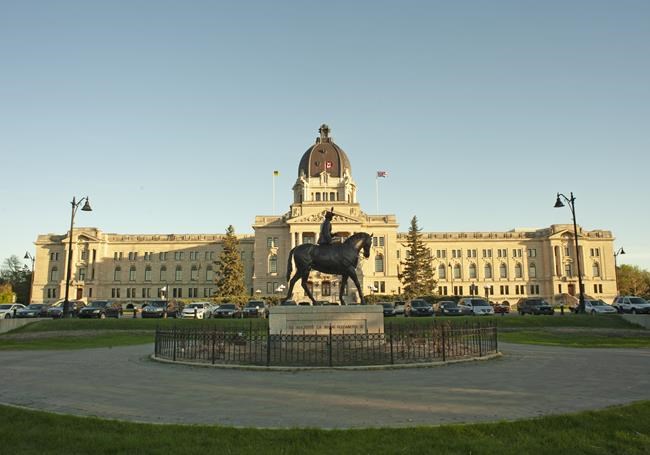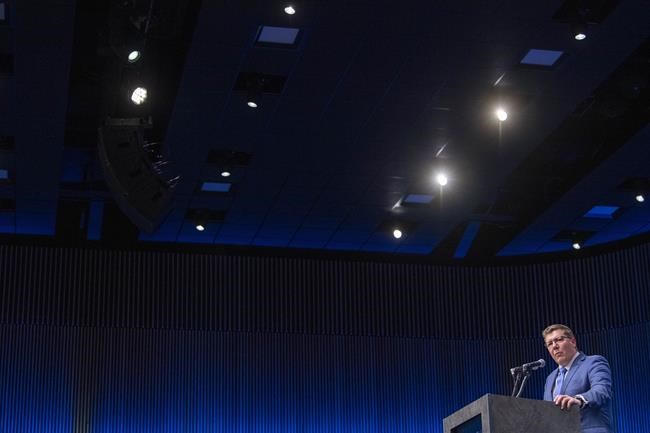Saskatchewan won’t impose more COVID-19 measures: Premier Scott Moe
Advertisement
Read this article for free:
or
Already have an account? Log in here »
To continue reading, please subscribe:
Monthly Digital Subscription
$0 for the first 4 weeks*
- Enjoy unlimited reading on winnipegfreepress.com
- Read the E-Edition, our digital replica newspaper
- Access News Break, our award-winning app
- Play interactive puzzles
*No charge for 4 weeks then price increases to the regular rate of $19.00 plus GST every four weeks. Offer available to new and qualified returning subscribers only. Cancel any time.
Monthly Digital Subscription
$4.75/week*
- Enjoy unlimited reading on winnipegfreepress.com
- Read the E-Edition, our digital replica newspaper
- Access News Break, our award-winning app
- Play interactive puzzles
*Billed as $19 plus GST every four weeks. Cancel any time.
To continue reading, please subscribe:
Add Free Press access to your Brandon Sun subscription for only an additional
$1 for the first 4 weeks*
*Your next subscription payment will increase by $1.00 and you will be charged $16.99 plus GST for four weeks. After four weeks, your payment will increase to $23.99 plus GST every four weeks.
Read unlimited articles for free today:
or
Already have an account? Log in here »
Hey there, time traveller!
This article was published 25/10/2021 (1495 days ago), so information in it may no longer be current.
REGINA – Saskatchewan Premier Scott Moe says he will not bring in additional COVID-19 measures because that would take away people’s personal freedoms.
Moe made the comment while delivering a state-of-the-province address to Saskatoon’s Chamber of Commerce on Monday.
He said COVID-19 vaccines are widely available, so his Saskatchewan Party government will not order lockdowns or restrictions that could lead to business closures.

“It doesn’t make sense to restrict everyone’s activities,” Moe said.
“We don’t think it’s fair, and we don’t think it’s right to impose those sweeping closures, those sweeping restrictions on all of the people when the vast majority … in this province have went out and done the right thing, and received the vaccine.”
Some medical experts and the Canadian Medical Association have been urging restrictions on gathering sizes as hospitals continue to admit a high number of COVID-19 patients.
Data from the Saskatchewan Health Authority for this month shows that Saskatchewan has had the most residents in intensive care units per capita than any other province at any point in the pandemic.
The province on Monday reported 170 new infections and 2,822 active cases. There were 293 people hospitalized with the virus, 81 of them in intensive care units. Nine of those intensive care patients are receiving critical care in Ontario.
Last week, chief medical health officer, Dr. Saqib Shahab, said COVID-19 vaccines are not enough to stop Saskatchewan’s fourth wave.
While cases have been trending downward, the province’s test positivity rate is at 10 per cent.
Shahab said “we’re certainly not out of the woods yet” as Saskatchewan may still see an increase in hospitalizations, including ICU admissions.
“It’s too early to be too confident right now,” he said.
“We need to sustain the course for the next four to six weeks to really get our cases down, get our hospitalizations down, and give our health-care system the chance to recover.”

Six critical care nurses are expected to arrive Wednesday from the military, which is also providing the province with an aeromedical plane to transfer COVID-19 patients to Ontario.
“They have provided six (nurses). We will add that to the 480 (critical care nurses) we have operating now,” Moe said. “I won’t say it’s going to make a significant difference, but at this juncture every difference matters. We’re very appreciative.”
In addition, 39 nursing students in Saskatchewan are getting trained to work in the province’s intensive care units, and the Saskatchewan Health Authority is hiring another 32 critical care nurses.
Scott Livingstone, CEO of the health authority, said the additional staff won’t be enough to bring back the 275 health-care services that have been cut, including critical heart and neurological surgeries, but will provide some relief to health-care workers.
“At this point in time, no there is no plan to restart slowdown services given the capacity issues we have with critical care, and wards with patients that are admitted,” Livingstone said.
Recent modelling shows unless more measures are introduced, health care might not return to sustainable levels until next March.
This report by The Canadian Press was first published Oct. 25, 2021.

